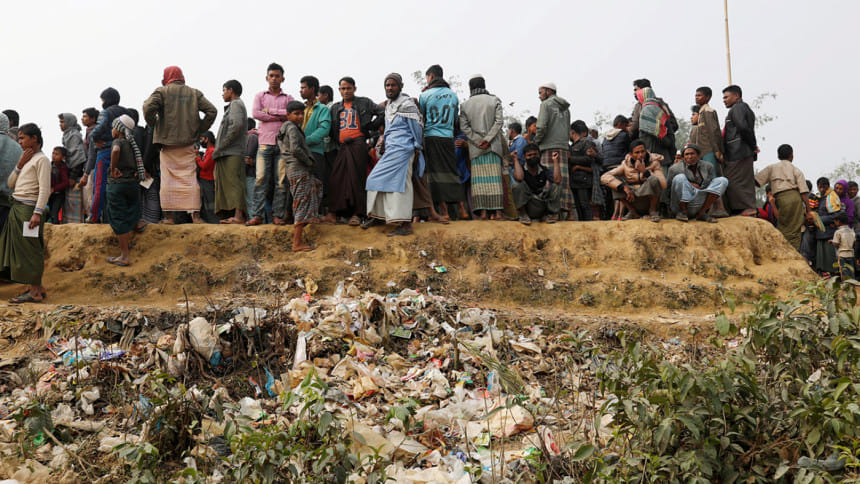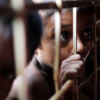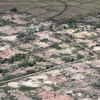More cops deployed to fight killing fear in Rohingya camps

Bangladesh is deploying thousands of extra police to Rohingya refugee camps in the south, officials said, after a series of mostly unexplained killings that have sown fear among hundreds of thousands of people who have fled from neighbouring Myanmar.
Since August, when a military crackdown in Myanmar forced many of the Muslim minority to cross the border into Bangladesh and seek shelter in the crowded camps, 19 people, some of them community leaders, have been killed.
Police have made a number of arrests in connection with some of the killings, but say the motives often remain unclear.
Conducted after dark and often by groups of men wielding pistols, knives, and sticks, the killings have sent a chill through the camps, which are guarded by the Bangladesh army during the day but manned by fewer police officers at night.
AKM Iqbal Hossain, police superintendent of the coastal town of Cox's Bazar under whose jurisdiction the camps fall, said a special force of roughly 2,400 men was being formed to guard the refugees.
A second senior officer, Superintendent Afrujul Haque Tutul, said police numbers were already being increased.
"We have 1,000 police officers right now for a million people, so you can imagine," he said.
More than 700,000 Rohingya have taken shelter in Cox's Bazar district since August, joining thousands who were already living there, making it the world's largest and fastest growing refugee camp.
Even before the August exodus, there had been violence in the camps, which Bangladesh police and aid workers have previously blamed on a struggle for control of supplies to the camps.
STABBED 25 TIMES
The latest killing, of 35-year-old Arifullah, took place last month on a busy road outside the Balukhali camp, where he had been appointed a leader of thousands of refugees.
A group of men surrounded him on the evening of June 18, stabbing him at least 25 times, police said. A pool of blood stained the spot the next morning, and a crowd of refugees could be seen gathered around.
Police said three Rohingya men had been arrested over the killing of Arifullah, who spoke English, had worked for international agencies in Myanmar, and often met foreign delegates who visited the camps.
His wife, who did not want to be named and asked Reuters not to disclose the location where she was interviewed because she feared attack, said Arifullah was a critic of the Arakan Rohingya Salvation Army (ARSA) – a militant group whose assaults on Myanmar security posts in August triggered the crackdown by the military.
The group says it is fighting for the rights of the Rohingya. Police said investigations into the murder were ongoing and they had not found links to ARSA.
A spokesman for ARSA referred Reuters to its January 31 statement that said other armed groups were responsible for "activities" at refugee camps and were using its name to malign its image.
The group said it did not attack civilians and would never carry out killings in the camps because it was thankful for Bangladesh's generosity in sheltering the refugees.
That statement was issued after the Jan. 19 killing of Yusuf, another English-speaking camp leader. Sitting on the mud floor of her shelter, Yusuf's wife Jamila said her husband had been watching a football match on his phone with his two sons when around a dozen men barged into their shelter in the Taingkhali camp carrying knives and pistols, shooting him twice.
She said police had urged her to file a case and name suspects, but she had refused, fearing retaliation, and because she did not want to leave her shelter for hours to go to court. "I'm scared for my children," she said.
Details of Yusuf's killing were confirmed by police superintendent Tutul at the Cox's Bazar police station. He said the police investigation was hampered because the refugees were afraid to name suspects.
He said intelligence received so far suggested several of the killings, including those of Yusuf and Arifullah, were due to personal disputes refugees had brought from Myanmar.
Police have arrested about 300 Rohingya in cases involving killings, robberies and abductions in the camps since the August influx, Tutul said.
Camp leaders at Balukhali and Taingkhali said the army had appointed Rohingya volunteers to keep guard at night, but most had stopped working because they were not being paid.
Foreign officials said security inside the teeming camps was a worry. "What I hear from my colleagues is that is obviously a big concern," Peter Maurer, president of the International Committee of the Red Cross, said on a visit to the camps on Sunday.
"It is obvious that it is a big challenge when you have big numbers, poor conditions, cramped situations."

 For all latest news, follow The Daily Star's Google News channel.
For all latest news, follow The Daily Star's Google News channel. 









Comments